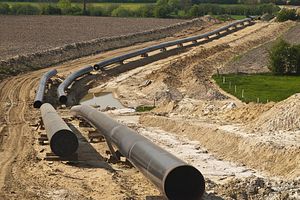Gurbanguly Berdimuhamedov, the president of Turkmenistan, is on a two-day visit to Pakistan. As noted in several Pakistani news outlets, the highlight of his discussions in Islamabad with Prime Minister Nawaz Sharif has been, of course, the Turkmenistan-Afghanistan-India-Pakistan (TAPI) pipeline.
The most optimistic voices say the pipeline can be completed by 2018; in December Turkmen authorities said late 2019. But Pakistan is keen to “fast-track” construction. Many regional watchers are deeply skeptical of either target date. Pakistan, however, has doubled down on TAPI, despite the continuing instability in neighboring Afghanistan, through which the pipeline must pass. This week’s visit marks Sharif’s third meeting with Berdimuhamedov in the past nine months. He attended the TAPI groundbreaking in December and in late May 2015 Ashgabat was the penultimate stop on his Central Asia tour.
Pakistan and Turkmenistan signed several cooperation accords and seven memorandums of understanding during their meeting. Among the agreements was a program of cooperation for the next two years signed by Tariq Fatemi, Special Assistant to the Pakistani Prime Minister on Foreign Affairs and Turkmenistan’s Foreign Minister Rashid Meredov. The MoUs signed covered energy cooperation, the exchange of financial intelligence and several covered relations between Turkmen universities and institutes and Pakistani academic institutions.
Terrorism made its usual appearance in discussions between Sharif and his Central Asian guest. The Associated Press of Pakistan reported that Sharif said, “This menace also undermines our endeavors for socio-economic development. We have to work collectively to eradicate the scourge of terrorism and extremism.”
But both leaders heaped the greatest praise on TAPI, extolling its potential to lead to greater regional integration, energy security and job growth. The 1,735-kilometer pipeline, if completed, is supposed to carry 33 billion cubic meters of gas from Turkmenistan to the Indian border. According to The Nation, Berdimuhamedov said “The gas line will bring warmth and cordiality, and generate economic activity, create job opportunities and improve the living standards.” On the Pakistani side, gas from Turkmenistan will help mitigate the country’s significant energy deficit.
This is a lot of optimistic talk about a project that has just began and has to cross a warzone to be completed. The roots of skepticism regarding TAPI (and full disclosure, I am a skeptic), are primarily financial and security in nature. The issue is not whether the project is technically possible or greatly needed. For example, construction on Turkmenistan’s internal East-West pipeline started in 2012 and the 773-kilometre pipeline completed construction in late 2015 and became operational this month. The Central Asia-China pipeline, running 1,833 km from Turkmenistan to Xinjiang (running north through Central Asia), began construction in 2007 and was completed by 2009.
Technical considerations aside, however, pipelines need financing and TAPI’s finances have been suspect–the pipeline is estimated to carry a cost of at least $10 billion. As noted in a Reuters article from December, “TAPI’s construction is led by state gas firm Turkmengas and none of global energy majors have so far committed to the project that will cost as much as a third of Turkmenistan’s total 2016 budget.” Turkmengas is said to be putting up 85 percent of construction costs. Dubai-based Dragon Oil is reported to be in talks with Turkmenistan to join the project, but there hasn’t been an update on that front since late November.
At risk of repeating myself, security in Afghanistan is still the biggest hurdle to TAPI’s completion. The TAPI project is based on an envisioned Trans-Afghanistan pipeline project attempted in the late 1990s that collapsed, eclipsed by events in the country. Given Afghanistan’s current security environment, the fractured but still fighting Taliban present a serious obstacle to the project’s completion. Certainly Turkmenistan will construct its piece of the pipeline, but there are many more miles to go before Pakistan and India can benefit from Turkmen gas.
Absent from what’s been reported of Berdimuhamedov visit to Pakistan is how the pipeline will be protected, during construction or after. Afghan President Ashraf Ghani has said that the country will put together a 7,000-strong force and that it would begin clearing the route in April. We’ll see.

































